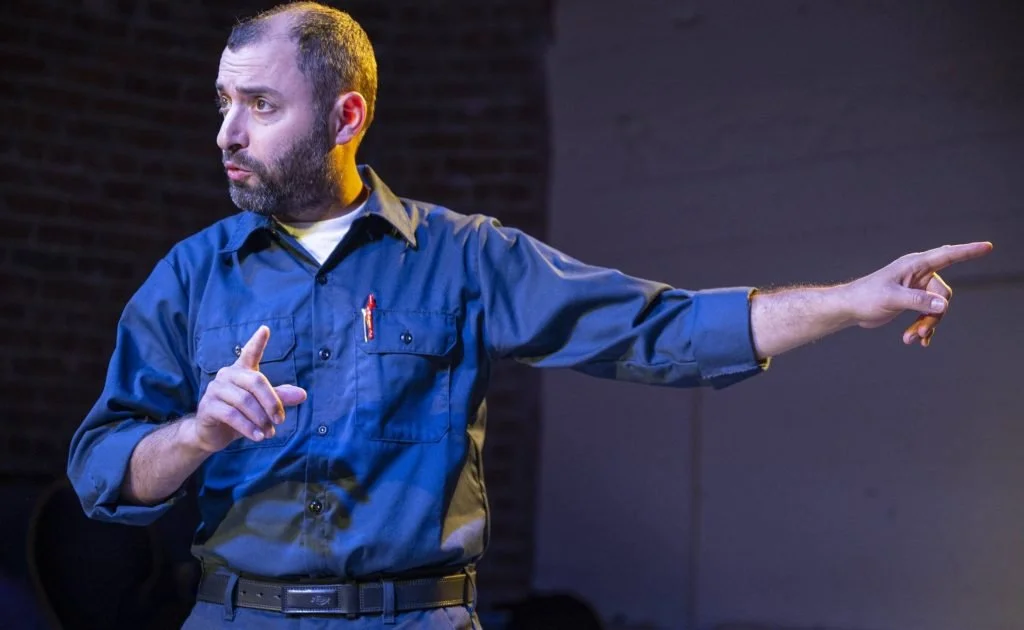“The Return” Reveals the Cost of Forbidden Love—at Golden Thread
Nick Musleh & Elissa Beth Stebbins. Photos: David Allen Studio
Eady & Mast Unveil Palestinian Identity Nightmare
by Jenyth Jo
In “The Return,” playwrights Hanna Eady and Edward Mast sensitively portray the suffering of Palestinians in Israel, where they are under constant suspicion and surveillance. When a Palestinian car mechanic’s painful past comes back to haunt him, we learn that his constrained life is much worse than headlines reveal.
An Israeli woman named Talia (Elissa Beth Stebbins) confronts the mechanic in his garage on the Jewish Sabbath. She says she recognizes him as Avi, but he claims to be Yaakov. When we learn they knew each other years ago, we join their mesmerizing, dangerous dance toward death.
As Avi/Yaakov, Nick Musleh’s brilliant performance leaves us in tears. Musleh’s character, a Palestinian who spent 13 years in Israeli prisons, now has “special privilege” to work on Israeli Army Jeeps. Avi goes by Yaakov now. As a cautious young man, he must always consider what is forbidden and what is permitted–a terrible way to live.
Nick Musleh (Him). Photos: David Allen Studio
Avi’s time in prison reprogrammed him to shrink into fetal position when he hears the word “Palestinian.” His screams reawaken memories of guards burning his family tattoo off his skin. This scene, and the knowledge that all his hopes for freedom have been squashed, opens the door to our understanding of Palestinian erasure.
In his new town Herzliya, Avi must report every outside contact, or risk further torture. His daily suffering affects us deeply because he just wants to live in peace.
On the other hand, we have a hard time understanding what Talia wants from Avi. Is she for him or against him? Was she the cause of his suffering? She cruelly lets him know that, because she’s an Israeli Jew, her word will always take precedence over his.
Elissa Beth Stebbins ably manages the difficult task of portraying an unlikable character. Talia suggests hidden cameras might be recording Avi in the garage. Why is he working on military vehicles? Talia refuses to understand Avi’s current dilemma.
Nick Musleh (Him) & Elissa Beth Stebbins (Her)
Twitching and shaking her way through their confrontation, Talia exposes her prejudices. Her lack of awareness makes us cringe. Stebbins moves us past empathy to distaste.
In scene after Kafkaesque scene, Talia reappears at the garage, pressuring and goading Avi. Heads turn back and forth, as we follow from the sidelines of the alley-like stage. The dialogue goes fast, then slow, creating suspense. But Talia remains naïve about the inhumane Israeli laws that rule Avi.
What was their past? We slowly learn of lying and betrayal. One lies for love. The other lies for pride. At times Talia appears delusional, thinking she can save him. But her savior complex might condemn him.
A surprising and satisfying climax builds on moments of hope. They imagine a visit to Yaakov’s family village of Ein Samara, a town where a fig tree grows by a freshwater spring. Avi knows that would be an appointment with death.
Despite their deceit and betrayals, we root for Avi/Yaakov and Talia. We realize their chance of happiness is slim indeed, but their struggle for love defies authoritarian rule.
“The Return” by Hanna Eady & Edward Mast, directed by Hanna Eady, scenic & lighting design by Kate Boyd, costumes by Michelle Mulholland, sound by James Ard, by Golden Thread Productions with Art2Action, Inc., at The Garret/ACT, San Francisco.
Info: goldenthread.org – to August 24, 2025.
Cast: Nick Musleh and Elissa Beth Stebbins.



